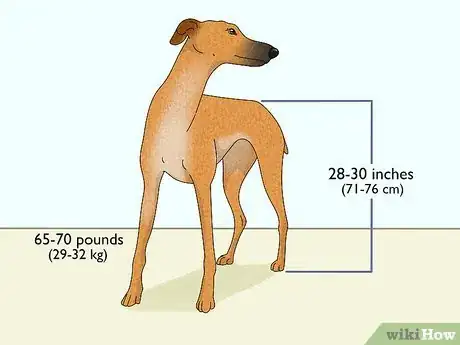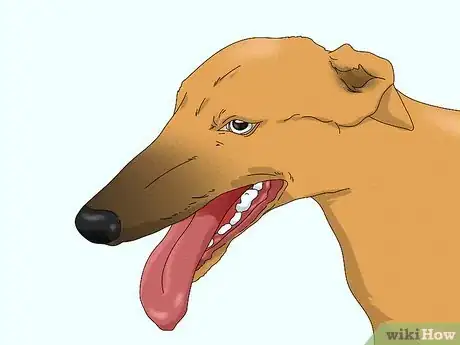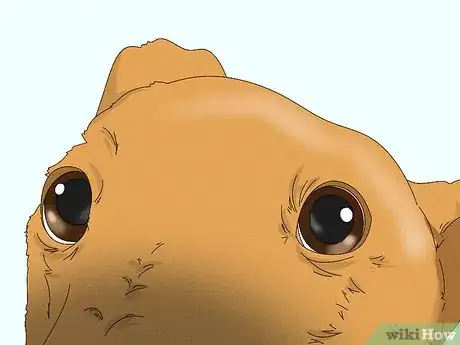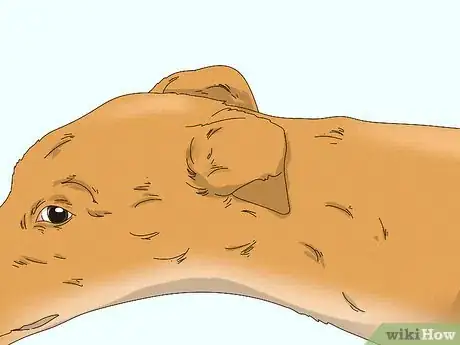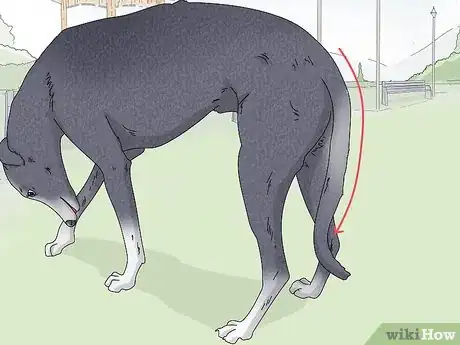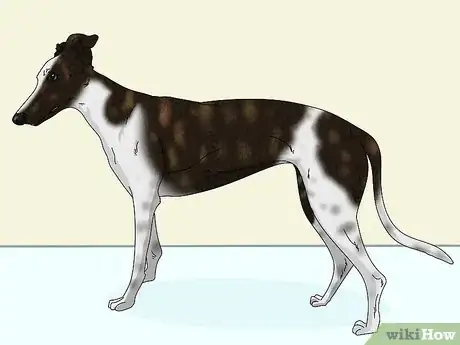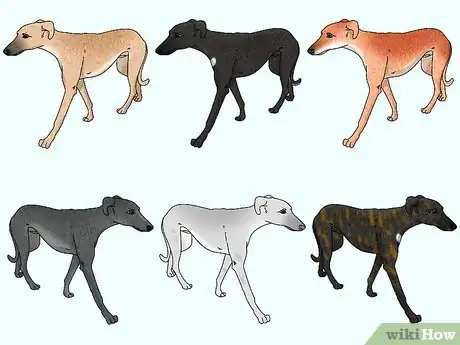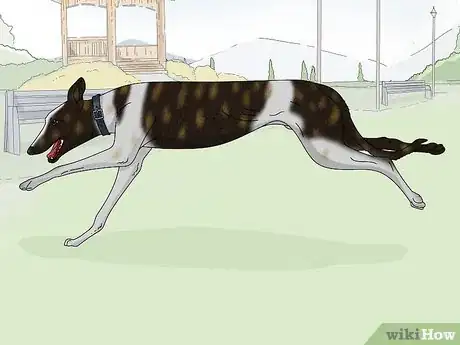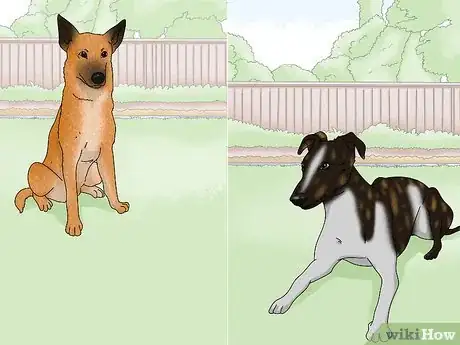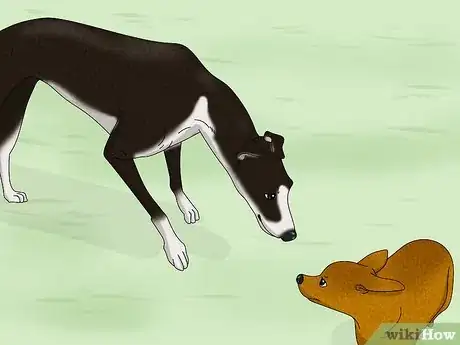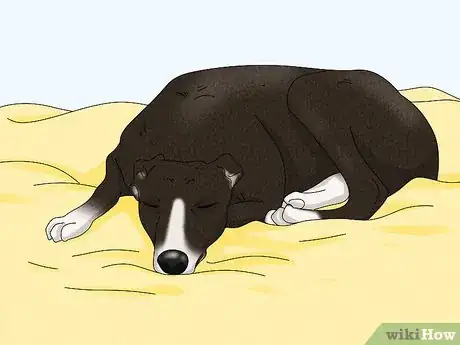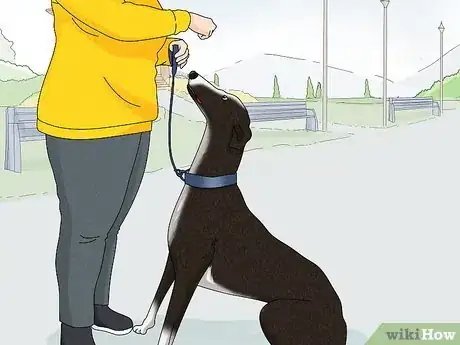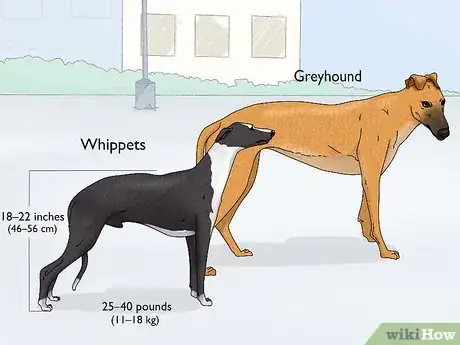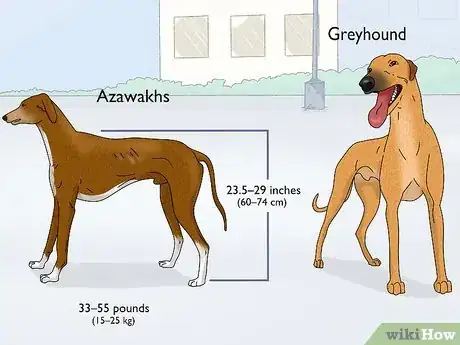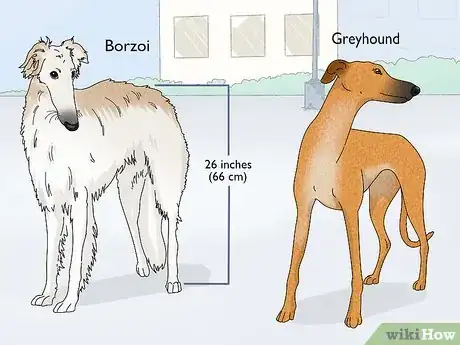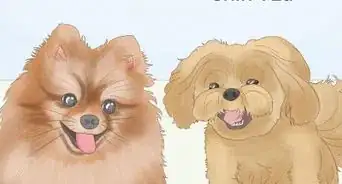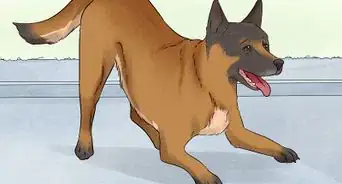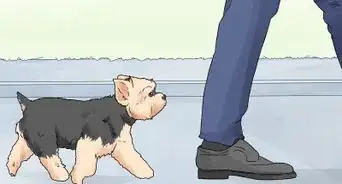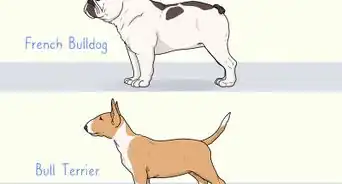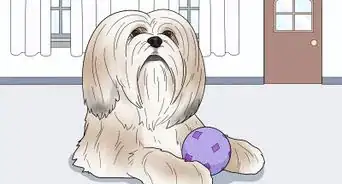wikiHow is a “wiki,” similar to Wikipedia, which means that many of our articles are co-written by multiple authors. To create this article, volunteer authors worked to edit and improve it over time.
There are 16 references cited in this article, which can be found at the bottom of the page.
This article has been viewed 13,553 times.
Learn more...
Greyhounds are known as the fastest of all dog breeds and are a member of the hound group.[1] They are thought to have been bred in Egypt to hunt the wildlife and were seen as majestic creatures by the Egyptian subjects.[2] Greyhounds share some traits with other dog breeds, but by recognizing how they differ, it can be easier to identify the breed. This wikiHow will help you know whether or not a dog is a Greyhound.
Steps
Checking the Body Structure
-
1Take notice of the size. Greyhounds are one of the larger dog breeds. Males are slightly larger than females, standing at 28–30 inches (71–76 cm) and weighing 65–70 pounds (29–32 kg), while females are 27–28 inches (69–71 cm) and weigh 60–65 pounds (27–29 kg).[3]
-
2View the head. A Greyhound's head is long and narrow. It is fairly wide between the ears with a powerful muzzle of good length and strong, even teeth.[4]Advertisement
-
3Look at the eyes. The eyes of a Greyhound are dark and bright. They give the dog an intelligent expression, indicating spirit.[5]
-
4Examine the ears. Greyhounds have small ears. They are fine in texture and are thrown back and folded, though when the dog is excited, the ears may be semi-pricked.[6]
-
5Inspect the tail. A Greyhound's tail is long and fine. It tapers with a slight upward curve.[7]
-
6Check the dog's overall build. Greyhounds have an athletic appearance. They have muscular shoulders, straight forelegs, broad backs, and long hindquarters.[8]
Seeing the Coat
-
1Check the appearance and texture of the coat. Greyhounds have short, smooth fur. The fur is firm in texture.[9]
-
2Disregard myths regarding the breed's name. Some people may believe that Greyhounds are always grey dogs, but this couldn't be further from the truth. Greyhounds may be seen with grey coats but actually come in every color. The coat color of a Greyhound is described simply as "immaterial".[10]
-
3Recognize common coat colors and patterns. A Greyhound may be any color, but there are some colors and patterns that are commonly seen. These may include fawn, black, red, blue, grey, or white for colors and brindle or parti for patterns.[11]
Recognizing Temperament
-
1See if the dog is athletic. Greyhounds are the fastest dog breed and are very athletic and graceful. They can jump at great heights and are swift runners, needing space to occasionally spread their legs.[12]
Did you know? Greyhounds are built for speed. They have aerodynamic skulls and shock-absorbing paw pads, among their other athletic traits.[13]
-
2Check if the dog is reserved. Greyhounds are not aggressive and are reserved around strangers. They are calm and quiet, and they are usually peaceful toward other medium or large dogs.[14]
-
3Look for a high prey drive. Because of their heritage, a Greyhound may chase around other small animals. They have strong instincts to chase small creatures, such as cats or small dogs.[15]
-
4Watch for sensitivity. Greyhounds prefer peace and quiet; they don't do well with loud noises. A Greyhound may also show signs of timidity or fearfulness as they are emotionally sensitive dogs.[16]
-
5
Understanding Differences Between Similar Breeds
-
1Tell if the dog is a Greyhound or an Italian Greyhound. Italian Greyhounds are the smallest of the sighthounds and resemble miniature Greyhounds, being members of the toy group.[18] These two breeds have almost identical traits, but one major difference is the size. Italian Greyhounds are significantly smaller than Greyhounds, standing at 13–15 inches (33–38 cm) in height and weighing only 7–14 pounds (3.2–6.4 kg).[19] Greyhounds and Italian Greyhounds are very similar in build, though Italian Greyhounds are more slender in all proportions.[20] Italian Greyhounds have glossy fur that may be any color or pattern except having tan markings or brindle, unlike Greyhounds who may be seen with these coats.[21] They are sensitive, playful, and alert.[22]
-
2Spot differences between Greyhounds and Whippets. Whippets are medium-sized sighthounds and part of the hound group.[23] Greyhounds and Whippets are strikingly similar in appearance, though Whippets are the smaller of the two breeds, with a height of 18–22 inches (46–56 cm) and a weight of 25–40 pounds (11–18 kg).[24] Whippets have rose ears and large eyes that may be round or oval in shape.[25] They are muscular and symmetrical with a powerful gait.[26] Whippets, like Greyhounds, may be any color, having immaterial coats, and have short, smooth, firm coats.[27] They are calm, playful, and affectionate.[28]
-
3Know if the dog is a Greyhound or a Sloughi. The Sloughi, nicknamed the Arabian Greyhound, is a medium to large sighthound from Africa that is a member of the hound group.[29] Sloughis and Greyhounds are roughly the same size, though Sloughis may be slightly smaller, standing at 24–29 inches (61–74 cm) in height with a weight of 45–70 pounds (20–32 kg).[30] A Sloughi has oval to almond-shaped eyes and medium-sized drop ears that are triangular with slightly rounded tips.[31] They are lean and athletic and have a supple gait.[32] Like Greyhounds, Sloughis have short, smooth coats; however, the coat of a Sloughi is any shade of light sand or cream to mahogany red fawn and may have brindling or black markings.[33] Sloughis are graceful, reserved, and noble.[34]
-
4Understand how Greyhounds and Azawakhs differ. Azawakhs are another African sighthound and part of the hound group.[35] They are tall but not quite as large as Greyhounds, with a height of 23.5–29 inches (60–74 cm) and a weight of 33–55 pounds (15–25 kg).[36] Azawakhs are seen with large eyes that resemble almonds in shape and high-set drop ears which are flat, wide, and triangular with rounded tips.[37] They are very fine and lean, their bodies fitting in a rectangle, with an agile and light gait.[38] The coat of an Azawakh is short, fine, and immaterial in color,[39] though red is commonly seen. Azawakhs are loyal, deeply affectionate, and independent.[40]
-
5See if the dog is a Greyhound or a Saluki. Salukis are among the oldest dog breeds and are an African sighthound from the hound group.[41] They are slightly smaller than Greyhounds, weighing 40–65 pounds (18–29 kg) and males having a height of 23–28 inches (58–71 cm), females being considerably smaller.[42] Salukis have either dark or hazel eyes and long ears covered with long silky hair.[43] They are symmetrical in build, with straight legs and a fairly broad back.[44] Salukis have soft, smooth, silky coats with recognizable feathering on the legs, shoulders, tail, and ears and may be white, cream, fawn, golden, red, grizzle and tan, tricolor, or black and tan.[45] They are independent-minded, dignified, and gentle.[46]
- Salukis typically are well-feathered, but a smooth variety may be seen. The smooth variety has no feathering.[47]
-
6Recognize differences between Greyhounds and Borzoi. Borzoi are Russian sighthounds that were once known as the Russian Wolfhound and part of the hound group.[48] Though Greyhounds are large dogs, Borzoi may be even larger, being 26 inches (66 cm) or taller and weighing anywhere from 60 to 105 pounds (27 to 48 kg).[49] They have slightly domed heads, with small ears that lie back on the neck and dark eyes which are never round.[50] Borzoi appear graceful and muscular, with a smooth and effortlessly powerful gait.[51] They may be seen in any color but, unlike Greyhounds, have long, silky coats that may be flat, wavy, or curly, with feathering on the neck, chest, legs, and tail, while the head and front of legs are smooth and shorthaired.[52] Borzoi are regally dignified, affectionate, and loyal.[53]
References
- ↑ https://www.akc.org/dog-breeds/greyhound/
- ↑ https://www.akc.org/dog-breeds/greyhound/
- ↑ https://www.akc.org/dog-breeds/greyhound/
- ↑ http://images.akc.org/pdf/breeds/standards/Greyhound.pdf
- ↑ http://images.akc.org/pdf/breeds/standards/Greyhound.pdf
- ↑ http://images.akc.org/pdf/breeds/standards/Greyhound.pdf
- ↑ http://images.akc.org/pdf/breeds/standards/Greyhound.pdf
- ↑ http://images.akc.org/pdf/breeds/standards/Greyhound.pdf
- ↑ http://images.akc.org/pdf/breeds/standards/Greyhound.pdf
- ↑ http://images.akc.org/pdf/breeds/standards/Greyhound.pdf
- ↑ https://dogtime.com/dog-breeds/greyhound
- ↑ https://www.yourpurebredpuppy.com/reviews/greyhounds.html
- ↑ https://www.akc.org/dog-breeds/greyhound/
- ↑ https://www.yourpurebredpuppy.com/reviews/greyhounds.html
- ↑ https://www.yourpurebredpuppy.com/reviews/greyhounds.html
- ↑ https://www.yourpurebredpuppy.com/reviews/greyhounds.html
- ↑ https://www.yourpurebredpuppy.com/reviews/greyhounds.html
- ↑ https://www.akc.org/dog-breeds/italian-greyhound/
- ↑ https://www.akc.org/dog-breeds/italian-greyhound/
- ↑ http://images.akc.org/pdf/breeds/standards/ItalianGreyhound.pdf
- ↑ http://images.akc.org/pdf/breeds/standards/ItalianGreyhound.pdf
- ↑ https://www.akc.org/dog-breeds/italian-greyhound/
- ↑ https://www.akc.org/dog-breeds/whippet/
- ↑ https://www.akc.org/dog-breeds/whippet/
- ↑ http://images.akc.org/pdf/breeds/standards/Whippet.pdf
- ↑ http://images.akc.org/pdf/breeds/standards/Whippet.pdf
- ↑ http://images.akc.org/pdf/breeds/standards/Whippet.pdf
- ↑ https://www.akc.org/dog-breeds/whippet/
- ↑ https://www.akc.org/dog-breeds/sloughi/
- ↑ https://www.akc.org/dog-breeds/sloughi/
- ↑ https://images.akc.org/pdf/breeds/standards/Sloughi.pdf
- ↑ https://images.akc.org/pdf/breeds/standards/Sloughi.pdf
- ↑ https://images.akc.org/pdf/breeds/standards/Sloughi.pdf
- ↑ https://www.akc.org/dog-breeds/sloughi/
- ↑ https://www.akc.org/dog-breeds/azawakh/
- ↑ https://www.akc.org/dog-breeds/azawakh/
- ↑ http://images.akc.org/pdf/judges/Azawakh_Standard.pdf
- ↑ http://images.akc.org/pdf/judges/Azawakh_Standard.pdf
- ↑ http://images.akc.org/pdf/judges/Azawakh_Standard.pdf
- ↑ https://www.akc.org/dog-breeds/azawakh/
- ↑ https://www.akc.org/dog-breeds/saluki/
- ↑ https://www.akc.org/dog-breeds/saluki/
- ↑ http://images.akc.org/pdf/breeds/standards/Saluki.pdf
- ↑ http://images.akc.org/pdf/breeds/standards/Saluki.pdf
- ↑ http://images.akc.org/pdf/breeds/standards/Saluki.pdf
- ↑ https://www.akc.org/dog-breeds/saluki/
- ↑ http://images.akc.org/pdf/breeds/standards/Saluki.pdf
- ↑ https://www.akc.org/dog-breeds/borzoi/
- ↑ https://www.akc.org/dog-breeds/borzoi/
- ↑ http://images.akc.org/pdf/breeds/standards/Borzoi.pdf
- ↑ http://images.akc.org/pdf/breeds/standards/Borzoi.pdf
- ↑ http://images.akc.org/pdf/breeds/standards/Borzoi.pdf
- ↑ https://www.akc.org/dog-breeds/borzoi/
